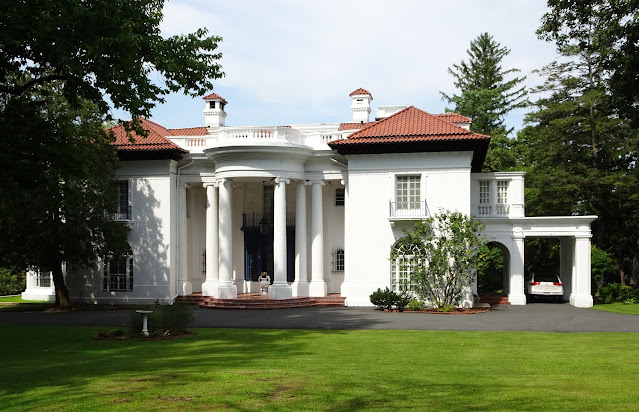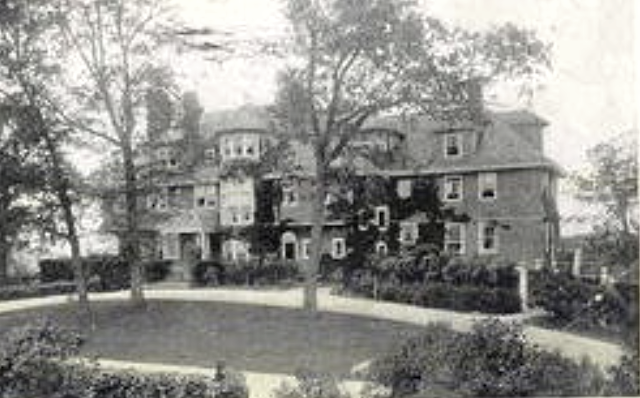Villa Lewaro: Home of African-American icon Madam C.J. Walker
 |
| Villa Lewaro, 67 North Broadway, Irvington, is shown in a 2016 photo by Jim Henderson. (Westchester County Photos by Jim Henderson, 2016) |
Madam C.J. Walker, America’s first self-made female millionaire, was the daughter of African-American slaves freed shortly before her birth, and remarkably lived to build Villa Lewaro on North Broadway in Irvington, N.Y.
The 34-room, 20,000-square-foot Italianate mansion was designed by Vertner Woodson Tandy — New York State’s first registered African-American architect — and built between 1916 and 1918. The mansion cost $250,000 at the time ($4.25 million today).
Madam Walker’s stay in the mansion was brief. She died on May 25, 1919 at age 51 and her daughter A’Lelia Walker inherited the estate.
The name Villa Lewaro was coined by famed Italian tenor Enrico Caruso, a friend who visited the mansion before Madam Walker’s death. Caruso took the first two letters of each of Lelia Walker Robinson’s three names. Lelia went by the name A’Lelia Walker after her mother’s death.
The renovated and restored Villa Lewaro stands at 67 North Broadway at its intersection with Fargo Lane.
Madam Walker was born Sarah Breedlove on Dec. 23, 1867 in a sharecropper cabin close to today’s Delta, La., near the Mississippi River to Owen and Minerva (Anderson) Breedlove, who had been enslaved on the Madison Parish plantation of Robert W. Burney until either the Emancipation Proclamation in 1863 or the revision of the Louisiana Constitution which banned slavery in 1864.
Sarah was one of six children, five of whom had been enslaved with their parents.
She was the only family member born into freedom, but she had a brutal childhood. Her mother died in 1872 and her father soon after.
Orphaned at age seven, Sarah moved to Vicksburg, Miss., to live with her older sister Louvenia and Louvenia’s husband, Jesse Powell, and worked as a domestic servant.
She later said she only had about three months of formal education -- that from Sunday School literacy lessons at a church she attended as a child.
In 1882, at 14, Sarah married Moses McWilliams to escape her abusive brother-in-law, Powell. She gave birth to A’Lelia in 1885 and McWilliams died two years later. Sarah married John Davis in 1894 at age 26 and left him in about 1903.
In 1906, she married Charles Joseph Walker, a newspaper advertising salesman, and began using the name Madam C. J. Walker. They divorced in 1912 and A’Lelia adopted the Walker surname in 1926.
Professionally, Madam Walker’s life was a record-setting success. In 1888, she and A’Lelia moved to St. Louis to be near three of her brothers, all barbers. It was through them she learned about hair care. She became a saleswoman around 1904 for a company owned by Annie Minerva Turnbo Malone selling hair-care products for African-American women and eventually branched out on her own after moving to Denver in 1905 and having a falling out with Malone who accused Madam Walker of stealing Malone's formula, a mixture of petroleum jelly and sulfur.
Madam Walker began selling her own line of hair care and beauty creams door to door with husband and business partner, C.J. Walker, handling publicity and promotions. A’Lelia handled the mail order side of the business and Madam Walker the sales and intensive training of sales personnel and beauty training for her customers.
The business proved a huge success and she eventually moved to Pittsburgh, Harlem and Indianapolis. She trained a sales and work force of 23,000, mostly women, and served customers in the U.S., Central America and the Caribbean and was soon able to leave the daily operations of her business to staff.
She used her new-found wealth to play a key role in African-American development during the Harlem Renaissance and after joining A’Lelia in Harlem in 1916, began building Villa Lewaro as a gathering place for community leaders and artists and to inspire other African Americans to pursue their dreams. She hosted an opening event at Villa Lewaro in May 1918 to honor Emmett Jay Scott, the Assistant Secretary for Negro Affairs in the U.S. Department of War in the Woodrow Wilson administration.
A’Lelia died in 1930 and left Villa Lewaro to the National Association for the Advancement of Colored People, but the NAACP was in financial trouble and sold it almost immediately to the a fraternal order, the Companions of the Forest in America, and became the Annie E. Poth Home for Convalescent and Aged Members of Companions of the Forest in America of that group.
Villa Lewaro was named a National Historic Landmark in 1976 and returned to private hands in 1993 with its sale to Harold Doley, founder of Doley Securities, LLC, the nation’s oldest African-American-owned and operated investment banking firm.
Doley underwrote extensive modernization, stabilization and renovation efforts on the mansion
In 2004, Villa Lewaro was added to the African American Heritage Trail of Westchester County and it was also designated a National Treasure by the National Trust for Historic Preservation.
In 2017, Westchester County certified an easement under the auspices of the National Trust, a significant step in the house becoming a museum, and the National Trust's African-American Cultural Heritage Action Fund confirmed the preservation easement, which would protect the historic and architectural qualities of the mansion and its property.
In 2018, Villa Lewaro was purchased by the New Voices Foundation, founded by Liberian immigrant Richelieu Dennis, the owner of Essence magazine and the founder of Sundial Brands, a skin and hair care products company which is now a division of Unilever. He purchased Madame Walker's brands in 2013 and relaunched them.
The New Voices Foundation website says it helps women of color entrepreneurs achieve their vision through innovative leadership initiatives.
Madam Walker’s stay in the mansion was brief. She died on May 25, 1919 at age 51 and her daughter A’Lelia Walker inherited the estate.
The name Villa Lewaro was coined by famed Italian tenor Enrico Caruso, a friend who visited the mansion before Madam Walker’s death. Caruso took the first two letters of each of Lelia Walker Robinson’s three names. Lelia went by the name A’Lelia Walker after her mother’s death.
The renovated and restored Villa Lewaro stands at 67 North Broadway at its intersection with Fargo Lane.
Madam Walker was born Sarah Breedlove on Dec. 23, 1867 in a sharecropper cabin close to today’s Delta, La., near the Mississippi River to Owen and Minerva (Anderson) Breedlove, who had been enslaved on the Madison Parish plantation of Robert W. Burney until either the Emancipation Proclamation in 1863 or the revision of the Louisiana Constitution which banned slavery in 1864.
Sarah was one of six children, five of whom had been enslaved with their parents.
She was the only family member born into freedom, but she had a brutal childhood. Her mother died in 1872 and her father soon after.
Orphaned at age seven, Sarah moved to Vicksburg, Miss., to live with her older sister Louvenia and Louvenia’s husband, Jesse Powell, and worked as a domestic servant.
She later said she only had about three months of formal education -- that from Sunday School literacy lessons at a church she attended as a child.
In 1882, at 14, Sarah married Moses McWilliams to escape her abusive brother-in-law, Powell. She gave birth to A’Lelia in 1885 and McWilliams died two years later. Sarah married John Davis in 1894 at age 26 and left him in about 1903.
In 1906, she married Charles Joseph Walker, a newspaper advertising salesman, and began using the name Madam C. J. Walker. They divorced in 1912 and A’Lelia adopted the Walker surname in 1926.
Professionally, Madam Walker’s life was a record-setting success. In 1888, she and A’Lelia moved to St. Louis to be near three of her brothers, all barbers. It was through them she learned about hair care. She became a saleswoman around 1904 for a company owned by Annie Minerva Turnbo Malone selling hair-care products for African-American women and eventually branched out on her own after moving to Denver in 1905 and having a falling out with Malone who accused Madam Walker of stealing Malone's formula, a mixture of petroleum jelly and sulfur.
Madam Walker began selling her own line of hair care and beauty creams door to door with husband and business partner, C.J. Walker, handling publicity and promotions. A’Lelia handled the mail order side of the business and Madam Walker the sales and intensive training of sales personnel and beauty training for her customers.
The business proved a huge success and she eventually moved to Pittsburgh, Harlem and Indianapolis. She trained a sales and work force of 23,000, mostly women, and served customers in the U.S., Central America and the Caribbean and was soon able to leave the daily operations of her business to staff.
She used her new-found wealth to play a key role in African-American development during the Harlem Renaissance and after joining A’Lelia in Harlem in 1916, began building Villa Lewaro as a gathering place for community leaders and artists and to inspire other African Americans to pursue their dreams. She hosted an opening event at Villa Lewaro in May 1918 to honor Emmett Jay Scott, the Assistant Secretary for Negro Affairs in the U.S. Department of War in the Woodrow Wilson administration.
A’Lelia died in 1930 and left Villa Lewaro to the National Association for the Advancement of Colored People, but the NAACP was in financial trouble and sold it almost immediately to the a fraternal order, the Companions of the Forest in America, and became the Annie E. Poth Home for Convalescent and Aged Members of Companions of the Forest in America of that group.
Villa Lewaro was named a National Historic Landmark in 1976 and returned to private hands in 1993 with its sale to Harold Doley, founder of Doley Securities, LLC, the nation’s oldest African-American-owned and operated investment banking firm.
Doley underwrote extensive modernization, stabilization and renovation efforts on the mansion
In 2004, Villa Lewaro was added to the African American Heritage Trail of Westchester County and it was also designated a National Treasure by the National Trust for Historic Preservation.
In 2017, Westchester County certified an easement under the auspices of the National Trust, a significant step in the house becoming a museum, and the National Trust's African-American Cultural Heritage Action Fund confirmed the preservation easement, which would protect the historic and architectural qualities of the mansion and its property.
In 2018, Villa Lewaro was purchased by the New Voices Foundation, founded by Liberian immigrant Richelieu Dennis, the owner of Essence magazine and the founder of Sundial Brands, a skin and hair care products company which is now a division of Unilever. He purchased Madame Walker's brands in 2013 and relaunched them.
The New Voices Foundation website says it helps women of color entrepreneurs achieve their vision through innovative leadership initiatives.
AUTHOR'S NOTES: To take a virtual tour of Villa Lewaro, click here. ... Some sources name others as the first female self-made millionaire in America, but the Guinness Book of World Records recognizes Madam Walker, saying her wealth is best documented. ... To see A'Lelia Bundles' "Villa Lewaro: Madam C.J. Walker's Dream of Dreams" video presentation, click here. A'Lelia Bundles is Madam Walker's great-great-granddaughter. ...
 |
Madam C.J. Walker is pictured behind the wheel driving three women in this photo believed to have been taken in Indianapolis, Indiana in 1911. (Wikimedia Commons) |











Comments
Post a Comment
If you would like to weigh-in, feel free ...